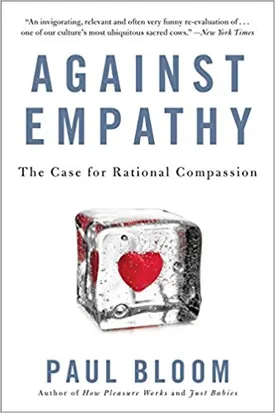Paul Bloom
Paul Bloom is an award-winning professor in psychology and cognitive science at Yale University, widely recognized for his contributions to the fields of psychology, human development, and behavioral science. As an accomplished author, professor and public speaker, he has presented his insights to the world through articles, books, and his many lectures and public appearances.
Born in Montreal, Quebec, Paul Bloom’s academic career began at McGill University where he graduated with a bachelor's degree in psychology. He then attended Oxford University where he completed his doctorate in psychology. After being appointed as a professor at Yale in 1996, he wrote his first book, How Pleasure Works: The New Science of Why We Like What We Like. It was the start of Bloom’s writing about the complexities behind what drives us and informs us.
Through his writing and research, Paul Bloom aims to understand why people behave and think the way they do. He covers topics ranging from cognitive science, behavioral science, and emotions, to morality, religious belief, and love. In his book, How Pleasure Works, Bloom suggests that pleasure comes from the interactions we have with our environment rather than by an individual’s own particular set of beliefs.
He argues that pleasure is an instinctive reaction to objects or experiences that bring joy, rather than an individual's ability to judge its value. This idea was expanded further in his later book, Just Babies: The Origins of Good and Evil, which looked at human nature and where it comes from. Bloom suggests that humans have certain impulses and emotions that are innate, and that one’s moral character is built from these instincts and sentiments.
In his most recent book, Against Empathy: The Case for Rational Compassion, Bloom critiques the increasingly popularized concept of empathy in psychology and beyond. Bloom explains that though many believe empathy is the bedrock of moral judgement, it has been linked to a range of damaging behaviors. He posits that sympathy, in contrast, is more useful in developing a productive approach to ethical decisions.
By combining rigorous scientific research and engaging storytelling, Paul Bloom’s work has become extremely popular and inspiring. His articles, books and lectures have been featured in a variety of publications and outlets, including The New Yorker, Scientific American, and Bloomberg. In addition, he has been awarded numerous accolades, such as the Steven Maier Award from the Society for Personality and Social Psychology, the Mind and Life Award from the John Templeton Institute and most recently the William James Book Award from the American Psychological Foundation.
Paul Bloom has become an esteemed figure in the world of psychology, cognitive science, and ethics. His work has not only been lauded for its clarity and accuracy, but for its ability to enlighten and inspire. His books challenge readers to think critically about their interpretation of their own actions and beliefs, helping them to discover even deeper connections with their environment and with each other.

